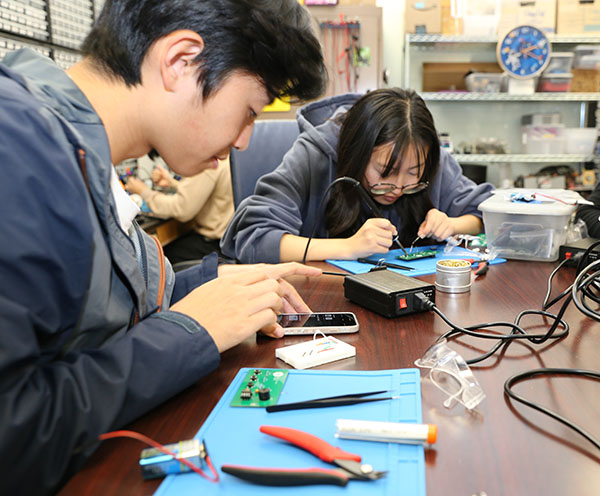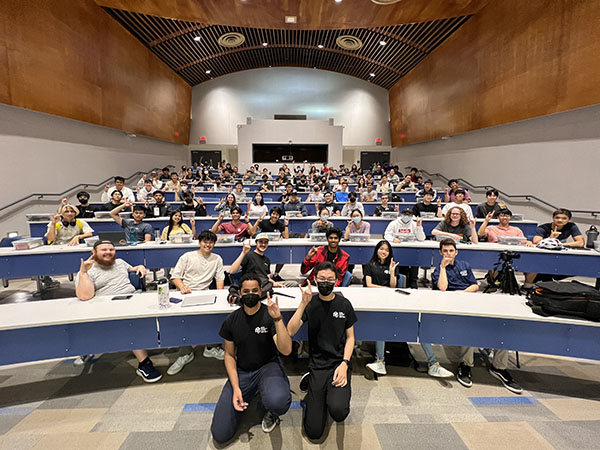Student Organization Provides Hands-on Experience Through Open Project Space

Dec. 21, 2023 - When Adam Wu arrived at UC Irvine as a first-year computer engineering major, he knew how to write computer code but didn’t have any experience with hardware. He wanted to gain hands-on project skills, so he turned to one of the Samueli School’s many student organizations for opportunities.
He discovered UCI’s student chapter of the Institute of Electrical and Electronics Engineers (IEEE), which offers members the chance to participate in guided projects. Wu was one of more than 200 students who applied to the Open Project Space, a student-led embedded electronics course for beginners.
OPS was founded at UCLA; UCI’s program started in 2020, with a fall quarter virtual course for 30 students. Four years later, they’ve expanded it to a yearlong program and accepted 100 students. Led by OPS alumni who are now upper division students, the extracurricular program offers lectures, workshops, lab sessions and weekly projects to teach fundamental embedded systems concepts, such as integrated circuits, microcontrollers, soldering, hardware communication and printed circuit board (PCB) design. Students pay an equipment fee up front for a parts kit and receive a partial refund when they complete the program.
“Our program’s curriculum helps students take concepts out of the classroom and apply them in projects,” said Rachel Villamor, a senior in computer engineering. “It also encourages you to be involved in the engineering student community. It’s been such a core part of IEEE at UCI’s growth over the last couple years.”
Villamor participated in the program during the pandemic. “As someone who didn’t have a lot of personal project experience, I got a lot out of it,” she said. “It built the foundation and confidence for me to apply to internships and made me want to become more involved with the engineering community.” Villamor is now the IEEE at UCI president.
Benjamen Bielecki, a computer science engineering senior and lead instructor of this year’s OPS, says a big appeal of the program for students is not just the lectures and the parts that are supplied but the access to equipment they wouldn’t have otherwise. The students complete six to eight projects over the course of the year. One-hour lab sessions, led by other undergraduate students, are offered at various times throughout the week.

This year’s OPS drew students from electrical engineering, computer engineering, computer science and mechanical engineering, but also from disciplines outside the engineering school and accepted students majoring in math, applied physics and music.
Bielecki says they select students based on who they think has the most to gain from the program. “We accept first- and second-year students and transfer students, those who haven’t had the time or opportunities to develop some of these hard skills, like soldering and PCB design and building hands-on projects. These aren’t things that are covered until upper division courses. The challenge is that at that point, you want to have acquired an internship of some kind and companies are looking for those skills.”
The projects start basic – such as a LED circuit and electronic piano with a 555 timer integrated circuit – and grow in difficulty to an interactive MP3 player, weather station and seven segment display stopwatch. During spring quarter, students will build a remote-control rover with a custom PCB.
Wu says there is a lot of figuring stuff out on your own. “You have to troubleshoot, which is an important part of being an engineering. It’s hard but that makes it fun for me. I enjoy doing hard problems and I hope to be able to design something on my own, a watch or timer maybe. So far the course has been more fun than frustrating and that’s good.”
– Lori Brandt
